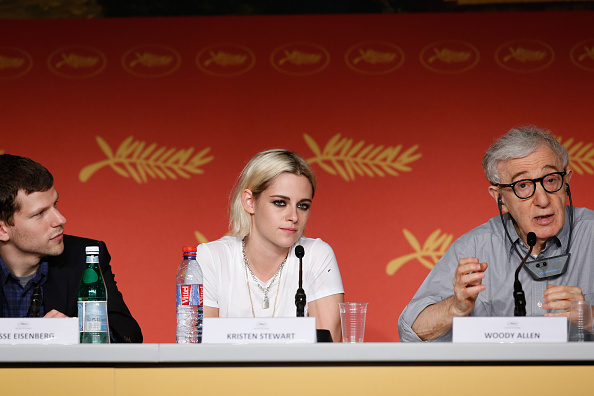Cafe Society: Press conference with Woody Allen, Kristen Stewart, Jesse Eisenberg, Vittorio Storaro and Blake Lively

Woody Allen has returned to Cannes this year with Café Society, which opened the festival on a wet, overcast morning on 11th May. After the film’s première, Allen, along with several members of the cast and crew, spoke about his craft, current casting choices and the film itself in an excitable press conference within the Palais des Festivals et des Congrès.
Café Society is a somewhat different opener to the film that began proceedings at last year’s Cannes. Standing Tall was seen as an attempt to demonstrate Cannes’ seriousness and solemnity; it was not particularly well received, and this year the festival has responded by providing Allen’s fun and forgettable romp through the workings of 1930s Hollywood. For many observers, Allen’s feature represents more of the same, and at least in terms of process he was keen to stress the continuity of his filmmaking, despite several new developments introduced in his latest effort.
Firstly, the director downplayed the significance of his move from film stock to digital: “The process is exactly the same. You go through the exact same motions. If anything, you have a few more options. It can be very beautiful.” The panel also included another new collaborator in the form of legendary Italian cinematographer Vittorio Storaro. Storaro’s work on the film is indeed beautiful, evoking the stunning cityscape of New York and the sun-bleached decadence of Hollywood, and he had many an eloquent word to say regarding his cinematographic philosophy. Storaro discussed the importance of “the relationship between light and shadow and colour” and using “the language of images”. He further noted how cinema in general is a method of “trying to understand who we are”, ultimately thanking Allen for the opportunity to work together.
Inevitably, most of the questions were directed at Allen, though the director had a humorous exchange with Jesse Eisenberg, the film’s star, regarding a script the latter had sent as young scriptwriter that had Allen in mind for the lead role. Eisenberg relayed that Allen had called the lawyers in. The similarities between the two are often insinuated, but Allen was quick to dismiss such claims: “I would have played this part of Bobby myself 30 years ago. But Jesse is a fine actor who can play it with more complexity than I could.” With regard to Bobby particularly, Allen explained: “The lead character is nothing like me. I didn’t go to Hollywood.” This may be somewhat disingenuous – false events do not necessitate false emotions and sensibilities – but Allen was clear to position himself within the film as its narrator, stating: “This move was originally conceived like a structure of a novel…Like a novel it should have the voice of the author. I wrote it so I thought I’d narrate it – it was cheaper.”
With Hollywood as the backdrop to events of the film, the question of fame was inevitably brought into discussion. Kristen Stewart, slowly establishing herself as the new darling of Cannes with Personal Shopper, also showing later in the week, was extremely forthright in her views of the Hollywood film industry: “There is an opportunistic element [to people in Hollywood]. People are always clawing at each other to get on top.” Allen was more balanced, declaring that the perks of being famous were “more advantageous than the downsides.” Stewart’s character in Café Society, Vonnie, remains sceptical of the trappings of celebrity and fame, but struggles to completely avoid the more seductive elements of unimaginable wealth and powerful, rich men. That Vonnie falls for the older man led some to question Allen’s continuing “romantic motif” of an older man and younger woman, but Allen merely claimed, somewhat unconvincingly, he had little experience of scenarios outside those he depicts in his films. This raised some eyebrows on the panel as well as in the press gallery.
Turning to Cannes, Allen explained that his films show out of competition because the very idea of competition in cinema goes against his “common sense” and should be reserved for “sport”. This sentiment went down interestingly with the Cannes executives in attendance. Appropriately, Café Society displays a similarly lax attitude to plot and believability, in contrast to the seriousness and solemnity of the films in competition at Cannes. When asked about the light touch in this year’s entry, Allen neatly summarised it: “If I don’t laugh I’ll kill myself. [The aim is to] adopt a comic perspective to an existence that is fraught with sadness and cruelty.”
Joseph Owen

























Facebook
Twitter
Instagram
YouTube
RSS